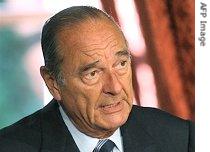2007年VOA标准英语-Chirac Leaves Mixed Legacy After 12 Years as Fr(在线收听)
Washington
09 May 2007
Outgoing French President Jacques Chirac leaves office in May 17, making way for center-right politician Nicholas Sarkozy, who defeated socialist Segolene Royal for France's highest office. In this report from Washington, Senior Correspondent André de Nesnera looks at Chirac's political career and his legacy.
 |
| Jacques Chirac delivers speech at the Elysee Palace in Paris, 4 Jan 2007 |
Inspired by General Charles de Gaulle to enter politics, he was elected in the mid-1960s to the National Assembly from the rural constituency of Correze. He first entered government in 1967 when then-prime minister Georges Pompidou named him a junior minister.
Mr. Chirac was prime minister twice, once for two years under president Valery Giscard d'Estaing and then during the presidency of socialist Francois Mitterrand. Those were the uneasy years of the so-called "cohabitation" between a center-left president and a center-right prime minister. That experiment also lasted for two years.
Mr. Chirac was also mayor of Paris for 18 years, from 1977 to 1995. During that time, he was tainted by a corruption scandal involving party financing and personal expenses. But he was never charged with any wrongdoing.
On his third try at the presidency, he was elected to France's highest office in 1995, then again in 2002. He did not stand for a third term, and with the election just a few days ago of a new French President, another center-right politician Nicholas Sarkozy, Mr. Chirac will leave the Elysee Palace May 17.
Charles Kupchan, a Europe expert with the Council on Foreign Relations, says Sarkozy's win brings about the retirement of a World War II generation of French leaders.
"And those French leaders, whether neo-Gaullists like Chirac or socialists like Mitterrand, tended to carry the mantle of Gaullism, which was a strong French role in the world, a strong Europe that would stand up to the United States," said Kupchan.
In foreign policy, experts say Mr. Chirac will best be remembered for his strong opposition to the March 2003 U.S. invasion of Iraq. Relations between Washington and Paris remain tense as a result of the diverging views on Iraq. But analysts say Sarkozy, openly pro-American, will begin to mend fences between the old allies.
In the Middle East, Mr. Chirac tried to reassert French influence especially in Syria and Lebanon, its former colonies. And in Africa, he attempted to mend relations with its former territories.
Simon Serfaty, an expert on Europe at the Center for Strategic and International Studies, says throughout his political life, Mr. Chirac took courageous positions.
"For example, within a few months of his election, he - at long last - acknowledged the responsibility of the French state during World War II in attending to the persecution of the Jewish populace and sought national forgiveness for it," explained Serfaty. "This is a man who refused to go to South Africa under any circumstances so long as apartheid would not be abolished."
Analysts say one of Mr. Chirac's greatest setbacks in the foreign policy realm came in 2005, when he was unable to convince the French to vote in favor of a constitution for Europe. And on the domestic front, throughout his presidency, Mr. Chirac was unable to put through major economic and social reforms.
Charles Kupchan says despite those reversals, Mr. Chirac's achievements are probably more significant than he is now getting credit for.
"He has, in some ways, been a lame duck president ever since the 'no' vote in 2005 on the constitution," he added. "And then his government was also dealt a blow when [Dominique] de Villepin, the prime minister, tried to implement a revision of the labor law and people took to the streets and blocked it.
"But, overall, during the last decade plus, he has guided French policy reasonably well," he added. "It turns out that his position on Iraq has proven to be more true than the position that was articulated by proponents of the war. The French economy, even though it [has] been somewhat sluggish with unemployment tenaciously hovering around 10 percent, has made some gains under his presidency. So I would say that even though his reputation right now has been lagging, it has been a pretty impressive run."
Many analysts say new French president Nicholas Sarkozy will focus his attention first on domestic concerns: economic and social reforms. Only then will he turn his attention to international affairs, which were, in the words of one analyst, "virtually ignored" during the presidential campaign.